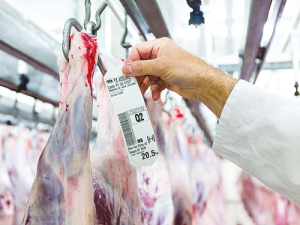Primary sector leaders praise speed and ambition of India–NZ free trade deal
Primary sector leaders have praised the government and its officials for putting the Indian free trade deal together in just nine months.
 New Zealand farmers don’t expect direct US tariffs but some global exporters could direct products into our key markets.
New Zealand farmers don’t expect direct US tariffs but some global exporters could direct products into our key markets.
The red meat sector is watching anxiously as the US embarks on a tariff war with its key trading partners.
While Beef + Lamb NZ (B+LNZ) doesn't expect the Trump administration to slap tariffs on NZ exports, the trade war could result in more meat products directed into our key markets thus impacting prices.
B+LNZ chair Kate Acland told Rural News that strong demand and a lower New Zealand dollar have lifted red meat prices.
"There are, however, risks on the horizon. We are keeping a very close eye on US trade policy developments which have the potential to create global market volatility," she says.
Acland says it's hard to predict how the tariffs war will play out.
"We don't expect direct tariffs on us, but some global exporters could direct products into our key markets."
US President Donald Trump's new 25% tariffs on imports from Mexico and Canada took effect last week, along with a doubling of duties on Chinese goods to 20%, launching new trade conflicts with the top three US trading partners. The three countries have retaliated with their own set of tariffs on US goods.
Acland, who recently visited the US, says her meetings with US farmers and ranchers were "an eye opener".
"US farmers are very concerned about the impact of high tariffs. Just like us, they consider themselves as an export industry."
The NZ red meat sector's key markets are China, the United Kingdom, the European Union, the US and Canada.
Demand for red meat in the US, UK, EU and Canada has been very strong and has offset the continued weakness of China. New Zealand's exporters have pivoted to the stronger markets with significant increases in volumes to these countries and a major decrease to China.
These factors, combined with a lower New Zealand dollar, lead to a major increase in the average export values for beef, lamb and mutton.
B+LNZ notes that demand in China for red meat is expected to remain low for the rest of 2024-25. The weak residential market, high youth unemployment, low foreign direct investment, and failing rural banks continue to weigh on any recovery in consumer spending.
It says that the Chinese government has announced stimulus package to revive growth and has injected some liquidity for its biggest banks, but this has so far not had a major impact on NZ's exports.
On a positive note, global shipping costs (including insurance) are decreasing. Freight rates spiked in December and January, as shipments from China to the US increased to get in before any proposed tariffs were to take effect.
The security issues in the Red Sea, which have affected passage to the Suez Canal, seem to have lowered and there has been more capacity and lower shipping rates on offer, rather than shipping around the Cape of Good Hope.
Global trade has been thrown into another bout of uncertainty following the overnight ruling by US Supreme Court, striking down President Donald Trump's decision to impose additional tariffs on trading partners.
Controls on the movement of fruit and vegetables in the Auckland suburb of Mt Roskill have been lifted.
Fonterra farmer shareholders and unit holders are in line for another payment in April.
Farmers are being encouraged to take a closer look at the refrigerants running inside their on-farm systems, as international and domestic pressure continues to build on high global warming potential (GWP) 400-series refrigerants.
As expected, Fonterra has lifted its 2025-26 forecast farmgate milk price mid-point to $9.50/kgMS.
Bovonic says a return on investment study has found its automated mastitis detection technology, QuadSense, is delivering financial, labour, and animal-health benefits on New Zealand dairy farms worth an estimated $29,547 per season.

OPINION: Here w go: the election date is set for November 7 and the politicians are out of the gate…
OPINION: ECan data was released a few days ago showing Canterbury farmers have made “giant strides on environmental performance”.